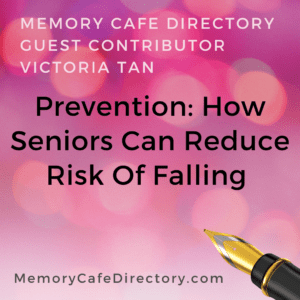Memory Cafe Directory posts and/or links to retailers can be advertising, sponsored, or affiliate links. We may earn a small commission from them. Thank you.
The risk of falling can become a significant concern as we age. Hip fractures are an all-to-common story. However, the good news is by adopting preventative measures and embracing the benefits of today’s retirement communities, older people can actively reduce the likelihood of falls and enjoy a safer and more fulfilling lifestyle.
Here, you’ll find practical strategies that can be implemented by today’s retirement age adults to reduce the risk of falling and avoid serious injury. It will highlight the advantages of today’s retirement communities, as well.
Maintain The Appropriate Level of Physical Fitness
Proper exercise regimes for today’s older adults are crucial for maintaining overall health and well-being. Regular physical activity can help these individuals improve the following:
- Strength
- Flexibility
- Balance
- Cardiovascular fitness
Exercise can also help to reduce the risk of falls and discourage the development of some chronic conditions. For example, a physical therapist, occupational therapist, or other health care provider can assist family members with exercise programs to improve muscle strength. An ideal program for older adults should focus on a combination of the following:
- Aerobic exercises
- Strength training
- Flexibility exercises
- Balance activities
Additionally, low impact exercises such as the following are recommended for cardiovascular fitness, especially in individuals with a high risk of heart disease:
- Walking
- Swimming
- Cycling
Strength training using light weights or resistance bands helps to maintain muscle mass and bone density. Both of these benefits contribute to better fall prevention. Stretching exercises enhance flexibility, while balance activities like tai chi or yoga promote stability and reduce the risk of falls.
If you are a retirement age individual, it is highly recommended you consult with your healthcare provider as to what type of exercise is most appropriate. As an older person, you may also want to consider working with a qualified fitness professional to design a personalized exercise program based on your abilities and health conditions.
Many retirement communities offer fitness programs tailored to the needs of retirement age and older individuals, frequently including the following:
- Yoga classes
- Water aerobics
- Gym facilities and more
Programs such as these allow residents to maintain an active lifestyle in a safe and supportive environment, without the fear of falling.
Modify the Living Environment As Needed
Maintaining a well-lit home is essential for preventing falls by making objects or potential tripping hazards more visible. It’s beneficial to have a lamp within easy reach of your bed as it provides immediate illumination if you need to get up during the night.
As someone who might be supporting a loved one, you should ensure adequate lighting throughout your home, especially in the following areas:
- Hallways
- Staircases
- Bathrooms
Take a moment to evaluate your home for any areas where the path to the light switch isn’t immediately adjacent to the room entrance. For these instances, consider replacing traditional switches with glow-in-the-dark or illuminated ones to make them easier to locate.
Always remember to turn on the lights before attempting to navigate stairways, as these areas can be particularly hazardous in poor lighting.
Lastly, storing flashlights in easily accessible locations around your home can provide a valuable safety measure in case of unexpected power outages.
Increased stability can be added by the following, helping to avoid fall-related injuries:
- Installing grab bars in bathrooms and showers
- Using nonslip mats
- Securing loose carpets or rugs
Today’s retirement communities prioritize safety for residents with mobility challenges. They implement various measures to ensure their well-being. These include the following:
- Installed handrails throughout the premises
- Added ramps to aid mobility
- Using nonslip flooring to prevent accidents
- Providing 24/7 emergency response systems
Additionally, these communities offer transportation services which enable residents to conveniently navigate the premises and nearby locations. Trained members of the care team are available to assist with mobility issues, such as transferring or using mobility aids.
Regular maintenance and safety inspections are promptly conducted to identify and address any potential hazards. Today’s retirement communities across the United States also promote social engagement and activities that are accessible to all residents. This fosters a supportive and inclusive environment.
Avoid Excessive Alcohol Consumption
While moderate consumption of alcohol can occasionally be part of a healthy lifestyle, it’s vital for seniors to be mindful of its effects on balance and reflexes. Alcohol impairs the central nervous system, slowing reaction times and reducing coordination, both of which can significantly cause an increased risk of falls.
Moreover, long-term heavy drinking can lead to chronic health issues like cardiovascular disease and liver damage, which can exacerbate the frailty often associated with aging. It’s important to note that alcohol can also interact negatively with certain medications, causing dizziness or confusion that may result in accidental falls. Alcohol consumption can temporarily contribute to low blood pressure.
Therefore, seniors are encouraged to limit their alcohol intake or avoid it entirely, particularly when they are alone or in an unfamiliar environment. It’s always recommended to consult healthcare professionals or a registered dietitians to help set personal limits on alcohol consumption that consider overall health, lifestyle, and medication regimen.
By making wise choices about alcohol use, seniors can greatly enhance their balance, improve their reflexes, and significantly reduce the risk of falls and associated injuries.
Medication Management Is Extremely Important
As a retirement age individual, you should review your medications with your healthcare professional to understand any potential side effects or interactions that could affect balance and coordination. It is essential to take medications as prescribed and avoid self-medicating or mixing alcohol with medication.
Retirement communities frequently provide medication management services, which helps to ensure the proper administration and monitoring of medication. This, in turn, helps to reduce the risk of medication-related falls.
Be Sure To Schedule Regular Vision and Hearing Checkups
Regular vision and hearing checkups are essential for maintaining sensory health. Hearing or vision problems can lead to balance issues which can put you at a higher risk for falls. Retirement age individuals should have their eyes and ears examined regularly and wear appropriate corrective or assistive devices like glasses or hearing aids.
Retirement communities sometimes offer on-site healthcare services which can include optometrists and audiologists. These services help to enable residents to conveniently address their sensory needs.
Stay Mindful of the Footwear You Use
Wearing proper footwear is vital for older adults to maintain stability and prevent falls – and avoid visits to emergency departments. Shoes should:
- Provide a comfortable fit
- Have nonslip soles
- Offer sufficient support
Wearing the following should be avoided whenever possible:
- High heels
- Loose slippers
- Flip-flops
- Shoes with worn-out soles
Retirement communities often provide guidance on appropriate footwear choices and may even offer access to shoe-fitting services or on-site stores. This helps to ensure that residents can have access to suitable footwear options and avoid environmental hazards.
Fall Risk Assessment Can Prevent Severe Injuries
Clearly, reducing the risk of falling is essential for today’s retirement age individuals to maintain their independence and overall well-being. By prioritizing physical fitness, modifying your living environment, managing medications properly, maintaining sensory health, and choosing appropriate footwear, you can significantly reduce fall risks.
Retirement communities provide a supportive environment that promotes a safer way of life. This allows today’s retirement age individuals to embrace an active and fulfilling lifestyle while reducing a number of risk factors, especially the chances of fall injury.
About the Author
Victoria Tan
 Victoria Tan is the Marketing Assistant for Morada Deer Park in Deer Park, Texas.
Victoria Tan is the Marketing Assistant for Morada Deer Park in Deer Park, Texas.






